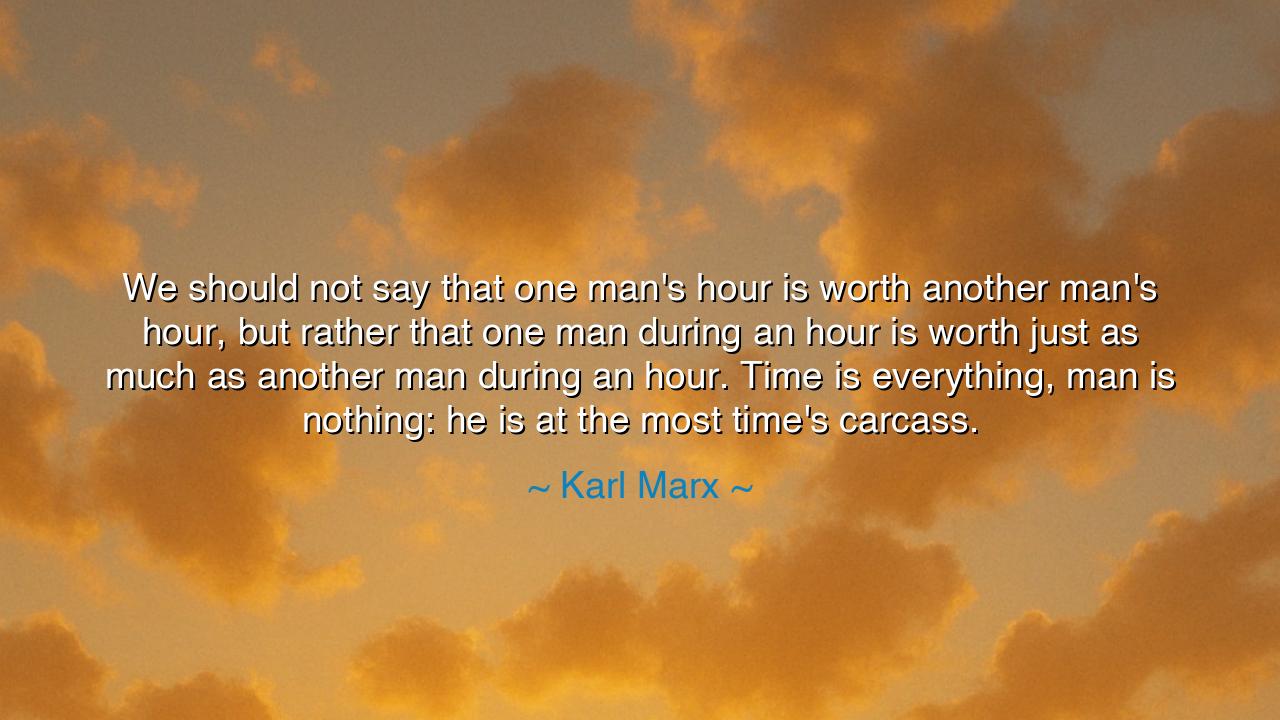
We should not say that one man's hour is worth another man's
We should not say that one man's hour is worth another man's hour, but rather that one man during an hour is worth just as much as another man during an hour. Time is everything, man is nothing: he is at the most time's carcass.






The words of Karl Marx in this quote strike like a hammer upon the soul: “We should not say that one man’s hour is worth another man’s hour, but rather that one man during an hour is worth just as much as another man during an hour. Time is everything, man is nothing: he is at the most time’s carcass.” Here, Marx lifts the veil upon the harsh reality of industrial life and the dehumanization born of a world where labor is measured not by the richness of a soul, but by the ticking of a clock. The hour—that merciless unit—becomes the equalizer of men, not their humanity, not their wisdom, not their dreams.
What Marx reveals is the inversion of truth: that in a world ruled by capital, man is stripped of his essence and becomes but a vessel for time’s consumption. Where once men were measured by courage, by craft, or by virtue, now they are measured by hours, their worth bound not to who they are but to how long they toil. Thus, time devours man, and man becomes its carcass—spent, discarded, forgotten, while the machine of industry grinds on.
Think of the laborers in the factories of nineteenth-century England, bent beneath the roar of the machines, their days stretched fourteen hours long, their children working beside them in smoke and soot. In such a place, the worth of one’s life was not one’s spirit, but the hours sold. And yet, within these factories, revolutions of thought began to grow. The realization dawned that if one man’s hour is no different from another’s, then all men—whether rich or poor—share in the equality of labor’s burden. It was this understanding that fueled the call for unions, for rights, for dignity, for the reclaiming of the human from the jaws of time’s tyranny.
The deeper wisdom here is both tragic and liberating. Tragic, because it exposes the cruelty of systems that reduce humanity to units of time; liberating, because it declares that in the essence of labor, all men are equal. A king’s hour and a pauper’s hour are the same hour—sixty minutes of heartbeat, sixty minutes of life slipping away. Thus, Marx reminds us that no man should exalt himself above another in the worth of his labor, for the hour makes equals of us all.
And yet, there is a higher teaching still: if time is everything, then how we spend it is the greatest choice of all. If man risks being nothing more than time’s carcass, then the only path to transcendence is to reclaim the hour as sacred. Each moment becomes a battlefield where we must decide whether to surrender our hours to emptiness or to infuse them with meaning. The danger Marx warns of is not only political, but spiritual: to live without awareness of time’s power is to become its slave.
For the seeker of wisdom, the lesson is clear: guard your hours with reverence. Do not sell them cheaply, nor waste them upon what does not nourish your spirit. Remember that your worth is not in how long you labor, but in how deeply you live within each span of time given to you. An hour of honest work, an hour of love, an hour of learning—these are riches no system can strip away.
Practical action arises from this truth: examine how your time is spent. Ask yourself each day—am I merely consumed by the hours, or do I shape them with intention? Where you must labor, labor with dignity, but never forget that beyond the factory or the office, the soul still cries out for purpose. Protect your mornings, protect your evenings, protect the fragments of time in which you can remember that you are more than labor’s carcass—you are a living soul bound to eternity.
Thus, let this teaching endure: time is the great equalizer, but also the great devourer. If man is at risk of becoming nothing but its carcass, then he must rise to claim his hours with awareness, with courage, and with meaning. For though the clock may measure us all alike, it is within our power to make each hour more than its measure—to make it a flame, a prayer, a testament that though time rules, the spirit still resists.






AAdministratorAdministrator
Welcome, honored guests. Please leave a comment, we will respond soon